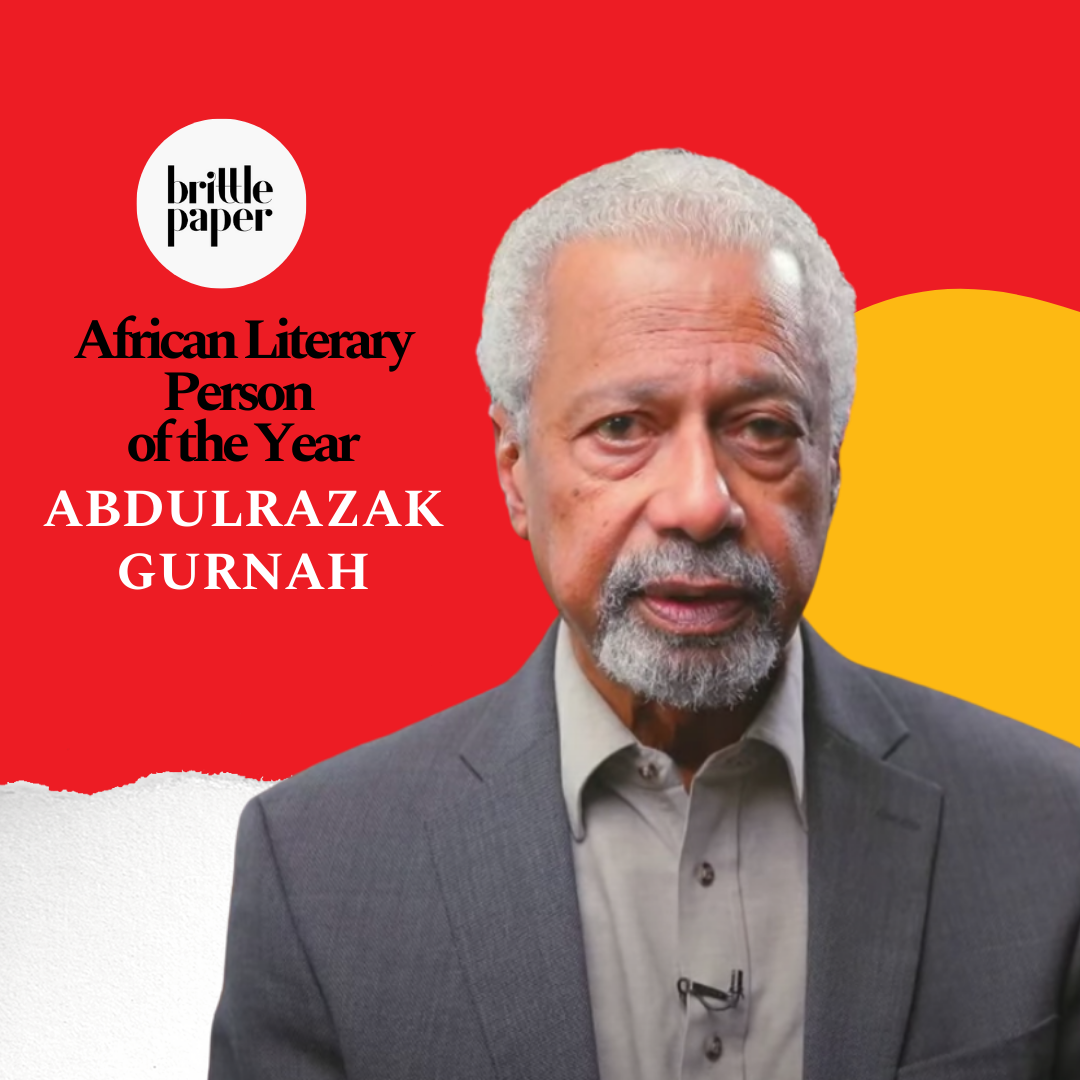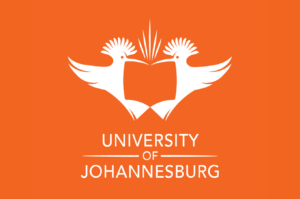
Brittle Paper’s African Literary Person of the Year, now in its 7th year, recognizes an individual who has done outstanding work in advancing African literary culture and industry in the given year. The 2021 honor goes to Tanzanian novelist and scholar Abdulrazak Gurnah, who won the Nobel Prize for Literature on October 7.
I know exactly where I was when I heard the news of Gurhah’s Nobel Prize win. I was seated at my desk editing a portion of my book, and my husband, standing in the doorway, called out, “Did you know that an African won the Literature Nobel?” When I found out it was Gurnah, I danced but only for a minute because it dawned on me that my entire day was shot, in fact my entire week. For the editor of a prominent African literary platform, Gurnah’s win meant extensive content curation, social media publicity, and a ton of anxiety over properly honoring the moment, which, by the way, we did!
In the days following his win, we asked hundreds of African writers, scholars, and industry folks to share their feelings about his win. 103 responses came back, which we published here. Wole Soyinka was the first person we approached and the first to respond. As the first black African to have won the Nobel prize, we wanted him to have the first word. The opening lines of his statement “The Nobel returns home,” has stayed with me ever since for what it says about the collective significance of Gurnah’s win. Seeing Gurnah’s name splashed on every headline from New York City to Shanghai made me happy because wherever Gurnah’s name went African literature came with. In a world where we live and breathe media, the importance of that kind of visibility is clear. The best wins are those that honor the individual as well as the culture.
Regardless of what the world imagines, Gurnah didn’t just burst into the scene this year. He has made a 50-year impact on African literature and the history of the novel more broadly. That’s the story I want to tell in this tribute. Gurnah was born in Zanzibar in 1948. At 18, he became a refugee in England, fleeing Zanzibar when the Arab majority was overthrown in a bloody civil unrest. In his Nobel Prize acceptance speech, Gurnah grants this event a shaping force in his decision to becoming a writer. Like Achebe and the generation of writers before him, Gurnah was thrust into the space of literary history by a traumatic encounter with violence. And like many of these writers, the experience inspired some of the most poignant writing in the history of fiction.
Gurnah has lived various facets of the Africa experience. He is an Arab African whose first language is Kiswahili. His coming-of-age experience is witnessing the breakdown of a post-colonial African state and becoming a refugee in Europe. In the early 1980s, he lived in Northern Nigeria where he taught at Bayero university. He later completed a doctoral thesis on west African fiction. His scholarly and literary work draw from Swahili, Arab, and south Asian traditions. He has mentored generations of writers through his editorial work at Wasafiri Magazine. Gurnah has lived the gamut of contemporary African experiences. In a sense, he is all of us.
His novels convey this deep connection to the diversity of the human experience. Listening to Gurnah talk about how the 1964 revolution upended his world, there is no doubt that it was a traumatic experience. What is far more remarkable, however, is how this experience of isolation, homesickness, and poverty while living in England became the fertile ground for some of his most impactful stories about loss and displacement. Writing happens in the distance we keep between ourselves and the places, memories, and people who make and break us. He is a writer who has seen a lot of pain. But pain enables emotional authenticity. His exploration of the colonial experience is devastating but beautiful and human. His characters are not always easy to love and, for that reason, are haunting. They are us. The decisions they make, their failure to always land on the good side of history, their struggle to belong at all cost, but also their determination to challenge patriarchy, ethnocentrism, and colonial violence speak to us today. Every Gurnah novel is a portrait of the African experience.
We also have to consider how Gurnah’s work has enriched African literature with East African, Indian-ocean-centered writing. Today we gush over Yvonne Adhiambo Owuor’s The Dragonfly Sea and Khadija Abdalla Bajaber’s recently published House of Rust, but the familiarity of these fictional worlds is based on a foundation laid by authors such as Gurnah, who insisted that the African story of colonialism was not just about the Atlantic Ocean and forest villages. It was also about the Indian ocean and coastal cities. In her response to Gurnah’s win Owuor speaks of his works’
quiet subversiveness, their casual affirmation of the long history of African cosmopolitanism, of an African oceanic imaginary that is so often neglected or ignored, in his tenderness to flawed and very human characters, his lyrical stylisation, and the storytelling that implants a long resonance in the reader’s heart.
The Indian ocean connects Africa to far-flung places like India, China, and Australia. In books like Paradise (1994), By the Sea (2001), and most recently Afterlives (2020), Gurnah explores Diaspora trading cultures, Zanzibar coastal communities and, thus, evokes global networks of economic and cultural relations in Africa that go as far back as the early modern period. His vision of the African past as global and expansive is a necessary addition to what Achebe and others have expressed in fiction.
The last time a Black African author won the Nobel Prize was Soyinka in 1986. I was five years old. So, witnessing Gurnah’s win felt like being part of something historic, like seeing a comet. In the hours following the announcement, I scrolled through Twitter reading the outpouring of celebration and was struck by the generational significance of his win. At 72, Gurnah is at the tail end of a passing era of writers, an era that already seem distant to younger readers. The thought that—thanks to his Nobel win—many young readers, some of whom are writers, will probably pick up Gurnah’s work for the first time makes me happy.
Gurnah’s win a major part a winning streak for African literature this year, which saw many African writers scooping up major international prizes. With literary accolades, they say that when it rains it pours. But let me close with some cautionary words from Ayi Kwei Parkes.
Writers like Gurnah, whose work speaks to the complexity of African identities, the West has found difficult to market as it is too far from the monolithic idea of Africanness or European settler narratives that they are comfortable with. For me, that’s the true significance of Gurnah’s Nobel win. It means that the work of writers like Zoë Wicomb and Tahar Ben Jelloun, whose work mines similar complexities might now get more attention in the global market as Western publishers, notorious for trend chasing, seek to find the next big ‘African writer’.
Even as we are delighted by Gurnah’s win, we have to remember that Western cultural institution cannot define the terms of value for African literature. Parkes warns us of the power of erasure held by the western publishing market in its claims to decide who gets to be seen or who remains in obscurity. We need to always push back by creating the spaces and institutions for celebrating and uplifting our writers. The Nobel Prize is nice, but it can’t make space for all the African writers, young and old, whose work need a lot more visibility than has been allotted them.
Parkes also points to one of the lessons in Gurnah’s win for younger writers. His refusal to trade the fullness and complexity of African experiences shows the power of resilience and belief in one’s creative expression. Gurnah may not have been a famous best-selling author until now, but he kept writing and did not compromised his art or politics: a great lesson for young writers and a source of inspiration for culture stakeholders to continue to support excellent writing no matter what.
Gurnah, thank you for always giving us something to love about African literature. Congratulations on being Brittle Paper’s 2021 Literary Person of the Year.









COMMENTS -
Reader Interactions